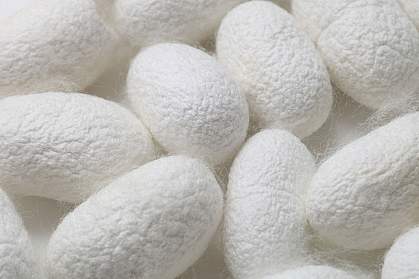You are here
July 23, 2012
Stabilizing Vaccines and Antibiotics With Silk

Researchers developed a way to use silk to store and distribute vaccines and antibiotics without having to keep them cold. By eliminating the need for refrigeration, the technique can lower costs and help expand the use of these lifesaving medical tools around the world.
Most vaccines and antibiotics need to be refrigerated to remain effective. Their chemical structures break down when they're exposed to heat or humidity, making them less potent. These compounds are currently handled by “cold chain” distribution networks, which keep temperatures down during transport, storage and handling. The process is expensive, accounting for up to 80% of the cost of vaccines.
The cold chain system severely limits the availability of vaccines and medicines in developing nations. Billions of dollars worth of drugs and nearly half of all global vaccines are lost annually due to high temperatures and humid conditions.
A research team led by Dr. David L. Kaplan at Tufts University investigated whether silk protein could increase the shelf life of vaccines and antibiotics at higher temperatures. Silk fibers purified from silkworm cocoons are highly resistant to changes in moisture and temperature. Previous studies have found that the fibers can form a mesh-like environment that helps to immobilize molecules and stabilize their structures.
The team developed a new silk-based film and tested it with the live measles, mumps and rubella (MMR) vaccine as well as the antibiotics penicillin and tetracycline. The MMR vaccine quickly loses potency above the recommended storage temperature of 2 to 8 °C (about 35 to 46 °F). Penicillin and tetracycline also break down quickly when unrefrigerated. The study was funded by NIH’s National Institute of Biomedical Imaging and Bioengineering (NIBIB), National Eye Institute (NEI) and National Institute of Dental and Craniofacial Research (NIDCR). It appeared on July 9, 2012, in the online edition of Proceedings of the National Academy of Sciences.
The researchers found that immobilizing the MMR vaccine in the silk film greatly enhanced its stability. Even after storage at 45 °C (113 °F) for 6 months, the vaccine retained more than 80% of its potency. Typically, the MMR vaccine would rapidly lose all its potency under those conditions.
Immobilizing antibiotics in silk greatly increased their stability, too. Tetracycline lost only 20% of its activity when stored in silk at temperatures as high as 60 °C (140 °F) for 4 weeks. These conditions would normally eliminate all its activity. Penicillin lost no detectable activity when stored in silk at 60 °C for 30 days. Typical storage of the drug under those conditions would bring a 20% loss of activity.
The ability to store vaccines and medications at high temperatures for long periods of time would enable much more effective distribution. This technique could have a significant impact on the health of people in developing nations.
“We have already begun trying to broaden the impact of what we’re doing to apply to all vaccines,” says Kaplan. “This could potentially eliminate the need for the cold-chain system, greatly decreasing costs and enabling more widespread availability of these life-saving drugs.”
Related Links
References: Proc Natl Acad Sci U S A. 2012 Jul 9. [Epub ahead of print]. PMID: 22778443
